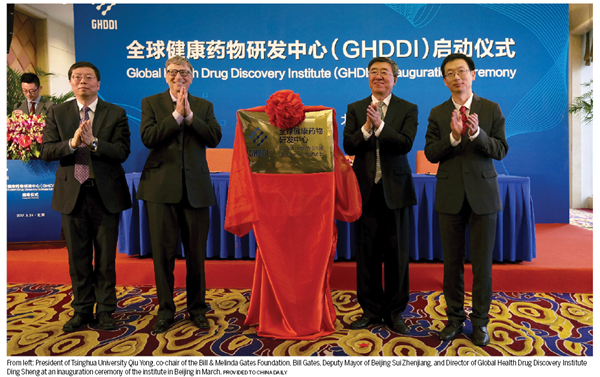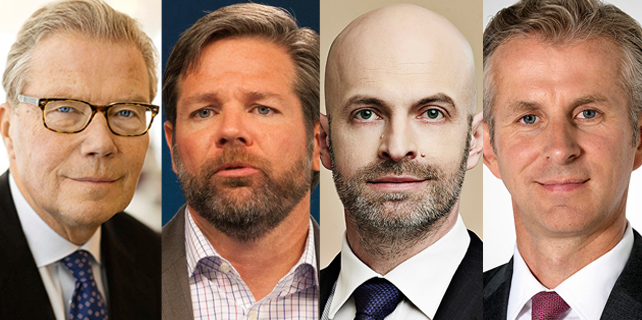Gates foundation has ambitious vision in china

Yinuo Li, China office director of the Bill & Melinda Gates Foundation, oversees the team that works with China’s public, private and nonprofit sectors to address key domestic and global health, development and policy issues.
Li started as a medical biologist, with an educational background in that discipline. After spending about 10 years at McKinsey & Co, where she was most recently a partner at the firm’s office in Palo Alto, California, she joined the Gates Foundation in 2015.
The foundation’s office in Beijing opened in 2007 with a focus on HIV prevention, tuberculosis (TB) control and tobacco control. Along with those efforts, the office developed important strategic partnerships with China’s public and private sectors to develop and deliver low-cost, high-quality health and development innovations that can improve lives in other countries, particularly those in sub-Saharan Africa.
The following are edited excerpts of an interview with Li:
What is the Gates Foundation’s focus in China?
China has always been an important partner for the foundation in advancing our global goals. Our vision for China is ambitious. While we continue to support development within China in areas such as HIV, tuberculosis (TB), tobacco control, and philanthropic development, we are also committed to supporting China as a development partner for the rest of the world. By tapping into Chinese resources, innovation and expertise, we aim to replicate China’s remarkable success in addressing health inequity and poverty in some of the poorest regions of the world.
China’s domestic reforms, increasing global engagement and emerging capacity for innovation only serve to reinforce our faith in China’s potential as a catalyst for development worldwide.
What have been the foundation’s biggest accomplishments in China so far?
I’d like to highlight our TB program. China is one of the top TB "high burden" countries. According to the World Health Organization (WHO), nearly 1 million people develop tuberculosis (TB) in China each year — more than in any other country except India and Indonesia. In addition to a high burden of the disease, China has about one-fifth of the world’s cases of multidrug-resistant TB (MDR-TB), which is especially difficult and costly to treat.
In the past eight years, we’ve been working closely with the National Health & Family Planning Commission on a TB-control program, which has significantly improved the accuracy and speed of diagnosis and treatment and reduced MDR-TB patients’ share of the cost by 80 percent.
Currently, our work covers the building and implementation of TB prevention and control models that target reducing the number of TB cases, especially Multidrug Resistant Tuberculosis (MDR-TB) cases. We are also working with partners to drive innovations in diagnostics, treatment approaches, monitoring, service delivery models and new financial approaches. The recent release of the National TB Control Plan 2016-20 is especially exciting and we are glad to have been part of the progress.
What are the biggest challenges in the world?
Definitely there are many challenges. But as Bill Gates said, if anything kills more than 10 million people in the next few decades, it’s most likely to be a highly infectious virus rather than a war. Not missiles, but microbes.
Now, part of the reason for this is that we’ve invested a huge amount in nuclear deterrents. But we’ve actually invested very little in a system to stop an epidemic. We’re not ready for the next epidemic.
In a world more interconnected than ever, it is vital that governments and the private sector invest and work together to ensure we can stave off future epidemics.
The Gates Foundation has been working with our partners around the globe to explore new approaches to build such kind of partnership. Global Alliance for Vaccines and Immunization (Gavi) is a great example in case. It was created to bring together the best of what key UN agencies, governments, the vaccine industry, private sector and civil society had to offer in order to improve childhood immunization coverage in poor countries and to accelerate access to new vaccines. It’s very encouraging to hear that since its inception in 2000, Gavi has helped developing countries to prevent more than 8 million future deaths.
What is the biggest challenge in China?
China has made huge strides over the past three decades, bringing hundreds of millions of people out of poverty and meeting significant health challenges. However, China still has over 40 million people living below the national poverty line — making China second only to India in terms of the largest population of the poor.
China has committed to eradicating extreme poverty by 2020. It’s not an easy job at all, as finishing the last mile fight has always been challenging.
The Gates Foundation is committed to join the last mile fight in China. We just signed a MOU this March with the Office of Poverty Alleviation and Development on poverty alleviation policy research, and promoting and sharing China’s poverty alleviation experiences both in China and worldwide.









